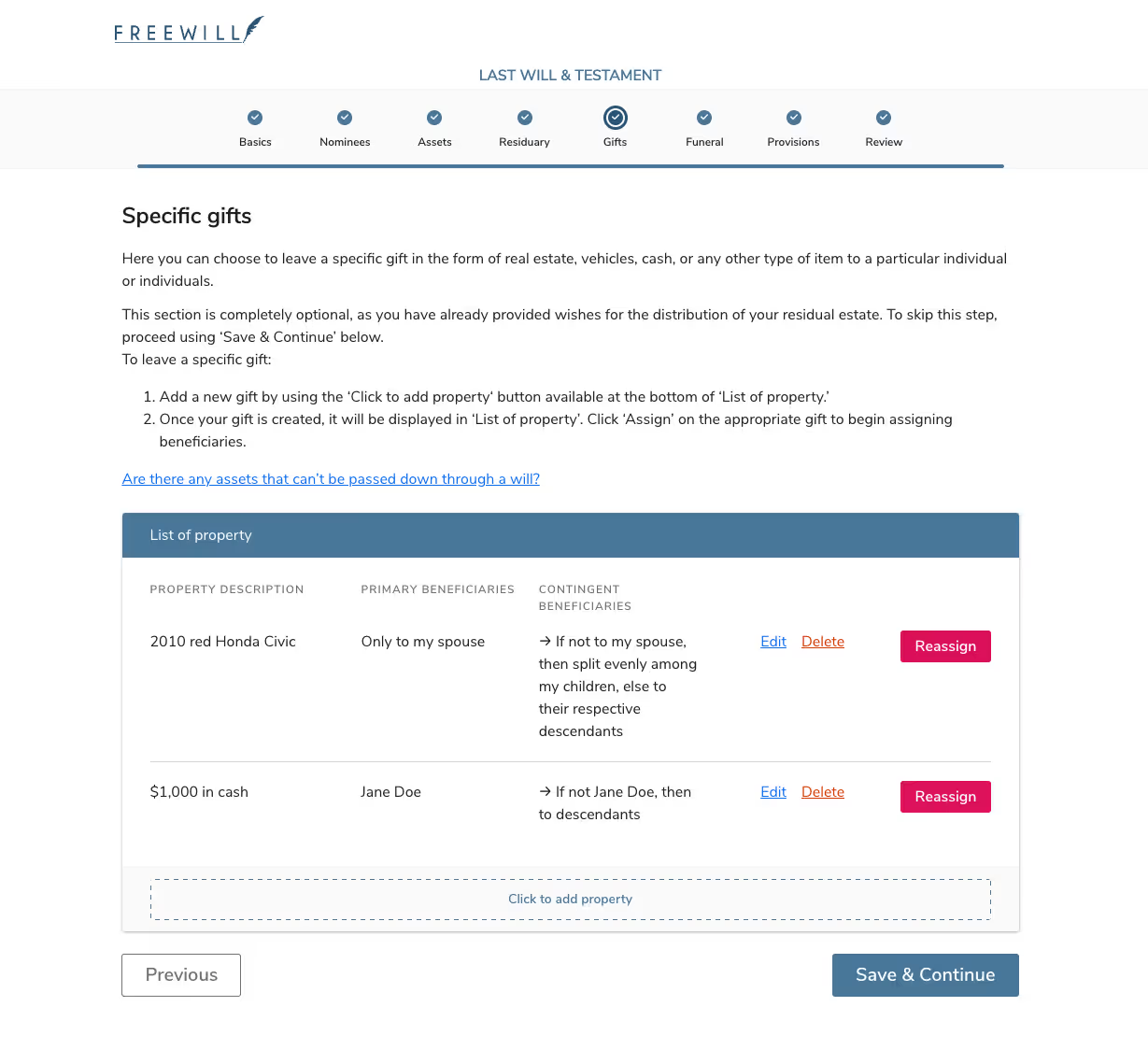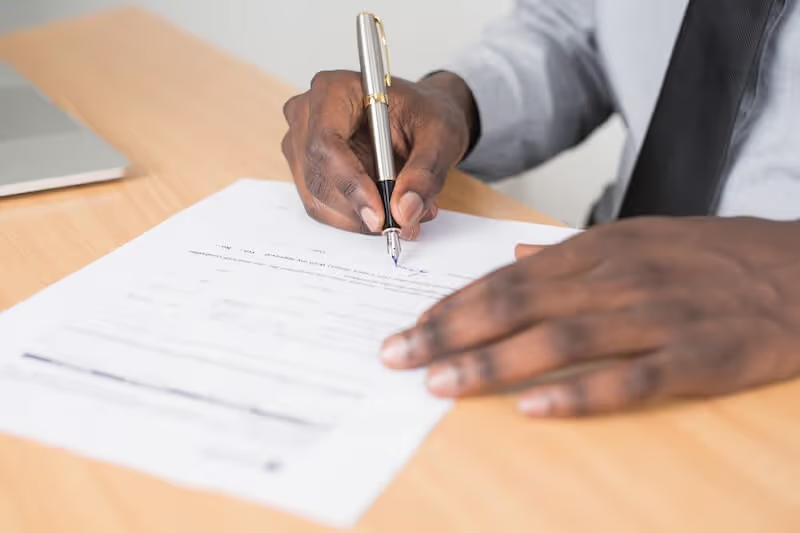Do you need a lawyer to make a will?
No, you don’t need to hire an attorney to create your will. Under the Sixth Amendment, American citizens have a right to legally represent themselves. This means you’re allowed to take almost any legal action on your own, including making your last will and testament.
Many people think making a will is a complicated process that requires the help of an attorney. However, if you have a simple estate plan, you can successfully write your own will without a lawyer.
There are some criteria you need to meet to make sure your will is legally binding that we’ll cover in more detail below. This is true whether you make your will on your own or decide to hire a lawyer to help you.
State laws about wills vary depending on where you live. It’s important to understand how the law applies to you. If you make your will using FreeWill, our documents are valid and legally binding in all 50 states and Washington D.C.
How to make a will without a lawyer
1. Decide how you’re going to make your will.
There are dozens of online and offline resources to help you make a DIY will, such as blank will forms and DIY will kits. One option is to use an online platform like FreeWill. Our online will-maker is easy to follow, customized to you, and includes guidelines specific to the state where you live. It’s also completely free to use and can take as little as 20 minutes to complete. Get started now.
2. Include necessary language to make your will valid.
All wills, regardless of how they’re made, must meet certain criteria to be legally valid. To make sure your will is recognized by the law, you must:
- State clearly in the document that this is your last will and testament
- Include your full legal name, so it’s clear the document belongs to you
- State that you’re of sound mind, and not under pressure from someone else to write your will
These statements make it clear you intend for the document to function as your last will and testament. This clarity can prevent confusion and discourage others from contesting your will in probate court.
If you use FreeWill to make your will, we automatically include this legal language in your will form, so you don’t have to write it yourself.
3. Choose a guardian for your minor children.
If you have children under the age of 18, this may be one of the most important things you do in your will. A legal guardian is someone who has legal authority and responsibility to care for your children if something happens to you. In your will, you can name a trustworthy person you want to look after your children if you were to pass away. It’s a good idea to name an alternate guardian, in case your first choice is unable to fulfill their duties.
4. List your assets.
List all your assets in your will. This includes your:
- Physical property — like your home, vehicles, and family heirlooms
- Financial assets — like your bank, investment, and retirement accounts
When listing your property, it helps to be specific. For example, instead of writing “my car goes to my wife,” write out the make, model, and color of the vehicle, and use your spouse’s full legal name.
If you use FreeWill to make your will, we prompt you to include all of this information and provide examples of how to describe your property.

5. Choose who will get each of your assets.
Once you’ve listed your assets, you need to choose the people or organizations you want to receive each asset. These heirs are called beneficiaries. Again, this should be specific — use the full legal name for each of your beneficiaries.
If you want to leave assets to a nonprofit, it’s helpful to include their EIN number to make them easier to identify. It’s also a good idea to name secondary beneficiaries for all of your property, in case you outlive your primary.
Make sure your beneficiary designations are in line with the beneficiaries you name on your non-probate assets, like your life insurance policy.
6. Choose a residuary beneficiary.
Your residuary beneficiary receives the remainder of your estate. This could be assets that other beneficiaries didn’t claim, or assets you didn’t name a beneficiary for. Your residuary beneficiary could be a charity.
7. Decide what should happen to your pets.
While pets generally feel like part of our family, they’re considered property under the law. This means you can’t name them as a beneficiary, or leave assets to them. But you can choose a pet guardian to watch over your pet if you pass away — in other words, naming someone as the beneficiary for your pets. You can also set aside money from your estate to cover the cost of caring for them.
8. Choose a will executor.
Your will executor is the person who will read your will and carry out your final wishes. They’ll handle the probate process, distribute property to your beneficiaries, and more.
9. Print and sign your will in front of witnesses.
This step is important — your will isn’t valid without your signature! When you sign your will, you should have witnesses present to also sign your will. Witnessing laws vary by state, but most states require two disinterested witnesses. “Disinterested” means your witnesses can’t be anyone who’s mentioned in your will or inherits something from your estate. They could be neighbors, roommates, friends, or extended family.
10. Store your will in a safe place.
Once your will is written, signed, and witnessed, you should store it in a safe, easily accessible place. Tell your loved ones and your will executor where it is, so they know where to find it when the time comes.
You might want a lawyer to help with your will if...
- You have complicated family dynamics (for example, you have a blended family, or want to disinherit your spouse or a child)
- You are a business owner
- You own a lot of assets, or own property in multiple states
- You think your will might be contested in probate court
Even if you decide to have a lawyer make your will, you can prepare your documents in FreeWill’s will template before meeting with an attorney, saving you time and money.
Ready to make your will without a lawyer? Create your free, legally-valid will in just 20 minutes.
What are the parts of a will?
No two wills are the same, but each one should be structured in a similar way. Here is the information you should include in your will:
- State that the document is your will and reflects your final wishes. You can also include a statement voiding any previous wills you made.
- Name the people or organizations you want to inherit your property after you die. These heirs are called beneficiaries. You can also choose someone to receive any leftover property you didn’t specifically name in the will.
- Choose someone you trust to carry out the wishes in your will. This person is known as your will executor.
- Name guardians to care for your minor children or pets, if you have them.
- Sign the will, and have at least two witnesses sign it as well. By signing, the witnesses promise that your will was truly written by you, and that you were of sound mind and not under pressure from someone else when you wrote it.

What can’t be done through a will?
A will is a powerful estate-planning tool, but there are some things you can’t do. These include:
- Transfer assets that you jointly own with someone else. For example, if you own a house and your spouse’s name is also on the deed, you can’t leave that house to someone else in your will.
- Leave money to your pets. Pets are technically considered property under the law, so you can’t leave money to them. You can, however, set aside money to be used for your pet’s care and gift it to your pet’s caretaker.
- Leave money for an illegal purpose.
- Place conditions on gifts related to marriage, divorce, or change of religion. For example, “Amy will receive this property if she gets married.”
- Provide legally-binding instructions for your funeral. You can provide funeral wishes along with your will documents, but they won't be legally binding in the eyes of the law. However, this is a great way to inform your loved ones how you would like your funeral arrangements handled.
What types of property can’t be passed on in a will?
There are certain types of property you can’t transfer through a will. This includes:
- Property you jointly own with someone else
- Property you transferred to a trust
- Any account or policy you’ve named a beneficiary for. This includes life insurance policies, pension plans, and 401(k) and other retirement accounts
- Any property (like stocks and bonds) held in a “transfer on death” account that you’ve named a beneficiary for
Do I have to notarize my will?
Unless you live in Louisiana, you don’t have to notarize your will to make it valid. In most states, you simply need to sign your will in front of two witnesses to make it legal. Those witnesses should be “disinterested,” meaning they aren’t named as beneficiaries or will inherit anything in your will.
Some people choose to prepare a self-proving affidavit to accompany their will. This is a notarized document signed by your witnesses, in which they swear under oath that you were of sound mind when you signed your will. This can speed up court proceedings in the future — but a self-proving affidavit is optional, and your will is valid without one.
What if I want to change my will?
There are two ways to modify your will. If you have minor changes, you can add a “codicil” to your will. A codicil is an addition or supplement added to your will that includes small changes. You might use a codicil to add a beneficiary or change the amount of a gift. Similar to a will, codicils must be dated, signed, and witnessed.
The second option is to simply make a new will. If you decide to make a new will, you should include a statement voiding your old will. Wills created using FreeWill automatically include this statement.
Creating a will is important to protect your legacy and care for your loved ones after you’re gone. If you’re ready, you can make your will for free through FreeWill.






















